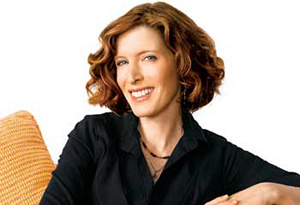Why Mom Really Does Know Best

Photo: Pixland/Thinkstock
Always telling your child what to do might seem easy, but it probably won't help her develop the skills necessary to navigate the challenges of life. Will letting her figure it all out for herself do the trick? Laura Day explains how your intuition is the key to successfully raising your child.
I just had an interesting, seesaw conversation with my young niece where I threw out possibilities for summer activities and she told me they weren't her style. Running the gamut from gymnastics to rock 'n' roll and art, she met every suggestion with rejection. "I am not a normal kid," she reasoned. "I like lying around." She listed people in our family and how stressed they were in an attempt to convince me she had a future in debate. At one point, I said, "You don't know anything yet and you are going to wreck your life if your adults continue to let you act on your ignorance." Inappropriate and mean? Yes. A therapy issue for my next session? Yes. True? Absolutely!The overwhelming demands of your own life and the guilt you may feel about not being able to give more, be there more and know more creates a dynamic that your child is particularly adept at taking advantage of. As much as parents want to respect a child's individuality, it's not uncommon for to assume your child has more knowledge of herself than she actually does, which ultimately ends up acting against her long-term best interests.
What's Behind the Attitude? Fear of the Unknown
People guard against encounters they're unprepared for. Children are no different. The difference and the danger is that a child lacks the life experience to know which situations to avoid because she dislikes it and which situations she's avoiding simply because it's unknown. Human beings are instinctively programmed against going into the unknown, even when it holds valuable opportunities. As parents, it's important to make the unknown safe—when it's desirable—and make sure your child trust you to lead them in the right direction. And, in those moments when there is an absence of trust, "Because I say so" is still effective.
Why It's Important Not to Quit
There is an appropriate time for negotiating and a time when negotiating just increases your child's anxiety and undermines her ability to meet the demands of growing up. Even the concept of "Just try it," sometimes backfires. But, the ability to create something pleasurable from a "mixed bag" is a skill that improves the quality of life at any age, and learning to quit just undercuts a child's incentive to master new skills in a challenging situation. Listening is often enough to remedy a hard moment. I have noticed children after having worked themselves into lather, often find their own wisdom about the situation, if simply heard and witnessed, but not allowed the option to quit. Of course, there will always be those situations when you, as a parent, feel a challenge is not right for your child or you change your mind mid-stream. That is a wonderful time to give your reasons, validate your child's opinion and decide together that enough is enough. The mean kid's camp may not be right for the summer or drums were a mistake, even though they now occupy your living room.
The value of a "melt down" is underrated. Often, a child simply being really mad at you and throwing a fit or two is enough to take the intensity out of the challenge. What's the greatest feeling of safety you can give your child? The knowledge that you will do what is in her absolute best interest despite her best efforts to dissuade you. In the moment, it may feel like the heartbreak of parenting, but in retrospect it is one of the most powerful acts to build the "intelligent" trust between you and your child, which she will carry into adolescence and integrate into her feelings about her own decisions in adulthood. You are the template that becomes her success.
The benefits of intuitive childrearing

Photo: Courtesy of Simon and Schuster
As the author of six books on intuition, I'm an advocate for using your intuition to make decisions about your child. I have found that the model child in most childrearing books simply doesn't exist. There is no general child X. Although a few rules hold true, such as the importance of consistency, community, communication and mutual respect, every system is flawed for your unique mix of parent/child/world, except for one that takes all your situation's unique variables into account. Intuitive childrearing is more adaptive for your child's development than any book or social more. This said, there is always wisdom to be gained from other people's experiences of "my child only eats white food" or "my tween wants to wear too little." However, the best intuitive for your child is not your child, but the people who work to make her life work: parents, teachers and other authority figures. Taking a step back and seeing your child through someone else's eyes will often help you make better decisions.
As much as I have wanted to go to bat for my son's misunderstood proclivities, more times than not, they were not things that would make him happier and more successful in the world. They were only things that were more comfortable for me not to deal with right now. Just like you, I am not immune to being offended by someone sharing their opinion of my son's failings; however, there is often great wisdom in the observation of someone who cares enough to comment.
You love your child, but her future is in other people liking her too. This is dependent, to a large degree, on her ability to interface in a variety of situations with confidence, talent, charm and skill. Even nursery school is a dog-eat-dog world. Let's just say the things I've heard in "circle sharing" on the rug, some adults might not be able to endure. If you think your loving judgment and firmness will crush her sense of self, just drop by a high school or look at a teenager's Facebook page. There is nothing you can do from love that won't be done to her out of raw competition and socialization in her future!
The key to intuitive childrearing is to respond to your individual child's ever-changing future and make the tough decisions now to create the best tomorrow. All children seem to have a diagnosis these days. Some of that is good. Issues are caught early and children often get more support in functioning than they did a generation or two ago when they just had to muscle it out until they got the hang of it. Your child may be fine with a touch of obsession, a little more moodiness, a dash of fearfulness if, and only if, you do not let her vulnerability mislead your judgment. Your child does not have the answer. You do.
Laura Day is the New York Times best-selling author of Practical Intuition and How to Rule the World from Your Couch.The Independent called her "The Psychic of Wall Street." Laura has been featured on The Oprah Show, Good Morning America and ABC News, as well as in Newsweek,The Wall Street Journal and other national and international media. She is currently working on her new book, No Biting, to be released in 2012.
Keep Reading:
3 powerful ways intuition keeps you connected
The ins and outs of love from an intuitive's perspective
What it means to feel wanted
As much as I have wanted to go to bat for my son's misunderstood proclivities, more times than not, they were not things that would make him happier and more successful in the world. They were only things that were more comfortable for me not to deal with right now. Just like you, I am not immune to being offended by someone sharing their opinion of my son's failings; however, there is often great wisdom in the observation of someone who cares enough to comment.
You love your child, but her future is in other people liking her too. This is dependent, to a large degree, on her ability to interface in a variety of situations with confidence, talent, charm and skill. Even nursery school is a dog-eat-dog world. Let's just say the things I've heard in "circle sharing" on the rug, some adults might not be able to endure. If you think your loving judgment and firmness will crush her sense of self, just drop by a high school or look at a teenager's Facebook page. There is nothing you can do from love that won't be done to her out of raw competition and socialization in her future!
The key to intuitive childrearing is to respond to your individual child's ever-changing future and make the tough decisions now to create the best tomorrow. All children seem to have a diagnosis these days. Some of that is good. Issues are caught early and children often get more support in functioning than they did a generation or two ago when they just had to muscle it out until they got the hang of it. Your child may be fine with a touch of obsession, a little more moodiness, a dash of fearfulness if, and only if, you do not let her vulnerability mislead your judgment. Your child does not have the answer. You do.
Laura Day is the New York Times best-selling author of Practical Intuition and How to Rule the World from Your Couch.The Independent called her "The Psychic of Wall Street." Laura has been featured on The Oprah Show, Good Morning America and ABC News, as well as in Newsweek,The Wall Street Journal and other national and international media. She is currently working on her new book, No Biting, to be released in 2012.
Keep Reading:
3 powerful ways intuition keeps you connected
The ins and outs of love from an intuitive's perspective
What it means to feel wanted



